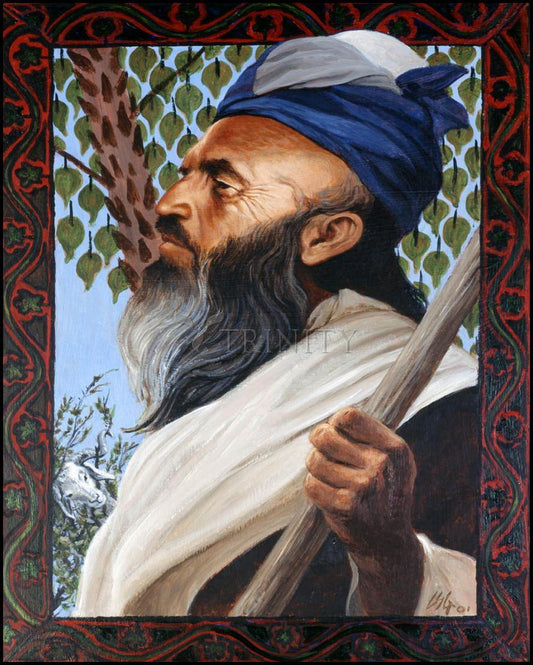'Now Faith is the substance of things hoped for, the evidence of things not seen.' (Hebrews 11.1)]
This classic definition of faith is no better exemplified than in the life of Abraham. We also see very clearly how faith works in the life of the believer " it inspires him to action. If we continue reading that chapter in Hebrews, we find a series of brief comments about men and women of faith. In each case, it shows how faith enabled a person to do something out of the ordinary. So faith is not a passive characteristic, it is the motivating force that enables great things to be achieved. Abraham was a man who believed the things that God told him; he also had great confidence that God would fulfill the things that He had promised to him.
The Call of God:
The biblical record of Abraham's life of faith begins when God calls Abraham to leave his homeland. (Please note that initially his name was Abram and that of his wife Sarai, but their names were changed by God to Abraham and Sarah). The first book of the Bible tells us:
`...the LORD had said unto Abram, Get thee out of thy country, and from thy kindred, and from thy father's house, unto a land that I will show thee: And I will make of thee a great nation, and I will bless thee, and make thy name great; and thou shalt be a blessing: And I will bless them that bless thee, and curse him that curseth thee: and in thee shall all families of the earth be blessed. So Abram departed, as the LORD had spoken unto him...' (Genesis 12.1-4)
This was a call to leave the civilization of the cities of Mesopotamia to become a tent dwelling nomad in a strange land. Abraham had every reason to decline God's invitation. One of man's most basic needs is for security and yet Abraham was being asked to leave his secure and settled life for an unknown future. As the writer to the Hebrews comments: `By faith Abraham, when he was called to go out into a place which he should after receive for an inheritance, obeyed; and he went out, not knowing whither he went.' (Hebrews 11.8)
We should never underestimate this act of faith. Compare Abraham's attitude with that of his descendants, the nation of Israel. They were invited by God to leave Egypt, where they were slaves suffering hard bondage. They too were asked to become nomads but very soon they wanted to go back to the security of Egypt. This was despite God's continuing care for them and the evidence of His power at work on their behalf. Abraham was a free and prosperous man but he never questioned or challenged the call of God; he went out in faith, not knowing where he was going. The lesson that the epistle to the Hebrews draws from this incident is that we should not be looking to things of this life to find happiness and security. It is only through God's promises that we will find lasting satisfaction and fulfillment.
The Testing of Faith:
As well as being asked to leave his settled homeland, Abraham was also asked to believe in a promise that God had made to him, a promise that in human terms looked very uncertain of fulfillment. God had said, `And I will make of thee a great nation.' (Genesis 12.2) In the previous chapter we are told that Abraham's wife Sarai was barren. How were Abraham's descendants to develop into a great nation when he had no son? The answer is that Abraham believed God. His faith was such that despite the unpromising circumstances, he knew that God could work in his life to bring about the child that had been promised. So Abraham obeyed the call of God in hope of the promise. His walk of faith had begun.
Despite having such great promises made to him by God, Abraham did not find his life an easy one. Firstly, he experienced a time of great famine in the land of Canaan. For once in his life, Abraham lost sight of the promise of God's care and blessing and he sought to find his own solution to the problem facing him and his household. He left the land God had led him to and went into Egypt. This didn't solve Abraham's problems; he just exchanged one set of difficulties for another equally life-threatening situation.
Because he had incurred the wrath of Pharaoh, Abraham was evicted from Egypt and returned to Canaan, now a rich man with sizeable flocks and herds. The size of the flocks, combined with the after effects of the famine, meant that the land couldn't sustain grazing for all the animals. So Abraham and his nephew Lot went separate ways, Lot choosing to move down to the well-watered Jordan valley, whilst Abraham remained in the mountains. Immediately afterwards, God made more specific promises to Abraham. This time He showed him all the land of Canaan and promised it to Abraham and his descendants for an everlasting inheritance. (Genesis 13.14-17) Subsequent events soon demonstrated Abraham's implicit faith in God's promise.
News came to Abraham that Lot had become embroiled in a power struggle between rival confederacies of city-states. Lot was taken hostage and carried away with the spoils of war from Sodom. On hearing the news, Abraham and his retinue of servants followed after this army, defeated them, released Lot and recovered the spoils. Hearing of the victory, the king of Sodom came out to meet Abraham and accepted Abraham's right as the victor in battle to keep all the spoil for we read that: `the king of Sodom said unto Abram, Give me the persons, and take the goods to thyself. And Abram said to the king of Sodom, I have lift up mine hand unto the LORD, the most high God, the possessor of heaven and earth, That I will not take from a thread even to a shoe latchet, and that I will not take any thing that is thine, lest thou shouldest say, I have made Abram rich.' (Genesis 14.21-24)
In this response we see another example of a living faith. His belief in God's promise influenced his thinking and actions. Abraham recognized that the promise was to be fulfilled by God's power and blessing, not through the tribute of a corrupt and pagan king. The epistle to the Hebrews tell us that `he looked for a city which hath foundations, whose builder and maker is God.' (Hebrews 11.10)
The Long Wait for the Promised Son:
So Abraham's confidence in the promise made by God that he would possess the land of Canaan was rock solid " but he was still childless. More than ten years had passed since God had promised that he would have descendants, and Sarah was still barren. But God reassured Abraham of His continuing concern for him and in Genesis chapter 15 we find the promises of God repeated and confirmed. (see Genesis 15.1-6) The last verse of that passage is very important. It tells us that `he (Abraham) believed in the LORD; and he counted it to him for righteousness.'
It is belief in God and His promises that will make us righteous; this is also confirmed in the New Testament. (see Romans chapter 4) As time passed Abraham reached his late eighties and Sarah her late seventies but there was still no child. Finally they succumbed to doubts and Abraham fathered a son through an Egyptian slave girl named Hagar. This did not solve Abraham's problem " indeed it created more difficulties by provoking bitterness and envy in his household.
Another thirteen years were to pass before God spoke to Abraham again, promising once more that he would have a son by Sarah:
`...Sarah thy wife shall bear thee a son indeed; and thou shalt call his name Isaac: and I will establish my covenant with him for an everlasting covenant, and with his seed after him.' (Genesis 17.19)
Abraham was reminded in these words that the promise of God related to eternal things, not just things in Abraham's life, or even the life of his promised son Isaac. Despite the natural impossibility of the promise, Abraham did believe what God had said and God's immediate promise was fulfilled. A year later Sarah gave birth to a son, whom they named Isaac. But God's involvement in Abraham's life did not end there " Abraham's faith was yet to undergo its most severe test.
The Call to Offer up Isaac:
Several years were to pass before the fateful moment when God spoke once more to Abraham:
`Now it came to pass after these things that God tested Abraham, and said to him, "Abraham!" And he said, "Here I am." And he said, "Take now your son, your only son Isaac, whom you love, and go to the land of Moriah, and offer him there as a burnt offering on one of the mountains of which I shall tell you."' (Genesis 22.1,2 ) The narrative continues with the immense understatement that `Abraham rose early in the morning.' Here we see the outstanding moment in the life of a great man of faith. God was asking Abraham to give up the son he had waited so long for, to give him back to God in obedience and trust. Abraham was prepared to do it because be believed in the power and love of his God. Again, the epistle to the Hebrews comments on this incident: `Accounting that God was able to raise him up, even from the dead; from whence also he received him in a figure.' (Hebrews 11.19) Abraham knew that God was all-powerful and loving, he knew God had made promises to him concerning his eternal future. These promises were certain, and even if Isaac were to die, Abraham knew God had the power to raise Isaac to life again.
This incident also speaks very powerfully to us as individuals. It is clear that the sacrifice of Isaac was a foreshadowing of the sacrifice of Jesus by a loving Father. In human terms that we can perhaps begin to understand, God is showing how much He loves us, since He was willing to sacrifice His own beloved son in order that we can be saved from our sins. Isaac was spared the sacrificial knife, but Jesus was not spared the cross.
What it Should Mean to us:
The experiences of Abraham are much more significant to us than merely providing an insight into the love of God. The promises to Abraham are the very kernel of the real Christian hope. The Apostle Paul wrote to the Galatians:
`And the scripture, foreseeing that God would justify the heathen through faith, preached before the gospel unto Abraham, saying, In thee shall all nations be blessed.' (Galatians 3.8)
The promises to Abraham are the true Christian gospel. They speak of a time of blessing for all nations to be achieved through the seed or descendant of Abraham. In Galatians chapter 3 Paul is at pains to stress that this reference to a seed did not refer to many descendants, but rather to one specific descendant, Jesus Christ (see Galatians 3.16). Through Christ, all nations can receive a wonderful blessing which will be fully realized when the promise to Abraham is fulfilled. He was promised the land of Canaan for an everlasting possession. Abraham never received it in his lifetime " he even had to buy a parcel of land to bury his wife. God keeps His promises, and so we can confidently expect God to raise Abraham from the dead to fulfill that promise. This will happen when Jesus Christ returns to the earth to establish the kingdom of God.
We need faith to believe in that prospect for the future, a faith as strong and committed as was Abraham's faith. We need to demonstrate that faith by our way of life " our trust in God's Word influencing our daily actions and aspirations. The first step of faith is baptism, by which we become associated with Christ and the promises to Abraham, as Paul wrote:
`For as many of you as have been baptized into Christ have put on Christ. There is neither Jew nor Greek, there is neither bond nor free, there is neither male nor female: for ye are all one in Christ Jesus. And if ye be Christ's, then are ye Abraham's seed, and heirs according to the promise.' (Galatians 3.27-29)
What reassurance that gives us. The chapter in Hebrews that reviews the example of faithful men and women like Abraham and Sarah, concludes with these words of encouragement to those who are prepared to follow their faithful example:
`And these all, having obtained a good report through faith, received not the promise: God having provided some better thing for us, that they without us should not be made perfect.' (Hebrews 11.39,40)
"”Excerpts from "œAbraham" by Bible Light Studies




















